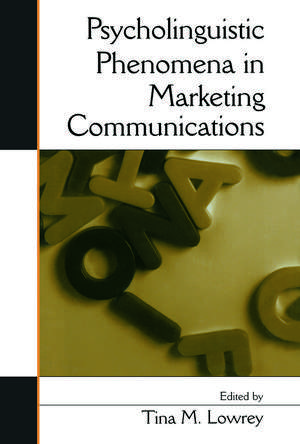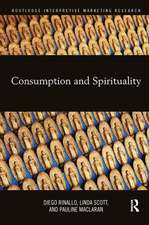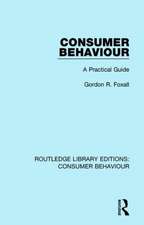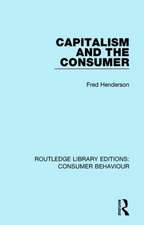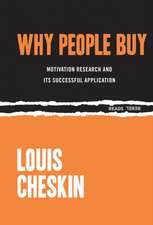Psycholinguistic Phenomena in Marketing Communications
Editat de Tina M. Lowreyen Limba Engleză Paperback – 11 ian 2013
The book includes authors from a variety of fields, including mass communication, marketing, social psychology, linguistics, and neuropsychology. A range of perspectives is discussed, from qualitative text analysis to controlled psychological experimentation. Psycholinguistic Phenomena in Marketing Communications is intended for students and scholars in numerous disciplines, such as advertising, marketing, social psychology, sociology, and linguistics. It is also suitable for graduate courses in these disciplines.
Preț: 325.00 lei
Preț vechi: 424.92 lei
-24% Nou
Puncte Express: 488
Preț estimativ în valută:
62.19€ • 65.10$ • 51.46£
62.19€ • 65.10$ • 51.46£
Carte tipărită la comandă
Livrare economică 05-19 aprilie
Preluare comenzi: 021 569.72.76
Specificații
ISBN-13: 9780415651134
ISBN-10: 0415651131
Pagini: 310
Dimensiuni: 152 x 229 x 22 mm
Greutate: 0.5 kg
Ediția:1
Editura: Taylor & Francis
Colecția Psychology Press
Locul publicării:Oxford, United Kingdom
ISBN-10: 0415651131
Pagini: 310
Dimensiuni: 152 x 229 x 22 mm
Greutate: 0.5 kg
Ediția:1
Editura: Taylor & Francis
Colecția Psychology Press
Locul publicării:Oxford, United Kingdom
Cuprins
Contents: Preface. T.M. Lowrey, Psycholinguistic Phenomena in Marketing Communications: An Overview. Part I: The Impact of Mere Words-Their Meanings and Sounds. J. Hoegg, J.W. Alba, Linguistic Framing of Sensory Experience: There Is Some Accounting for Taste. P.F.D. Gontijo, S. Zhang, The Mental Representation of Brand Names: Are Brand Names a Class by Themselves? L.J. Shrum, T.M. Lowrey, Sounds Convey Meaning: The Implications of Phonetic Symbolism for Brand Names. S. Zhang, B.H. Schmitt, Phonology and Semantics in International Marketing: What Brand Name Translations Tell Us About Consumer Cognition. D. Lerman, Phonology, Morphology, and Semantics: Towards a Fuller Conceptualization of Brand Name Meaning. Part II: Stringing Words Together-The Importance of Sentences.
R. Meeds, S.D. Bradley, The Role of the Sentence and Its Importance in Marketing Communications. C.V. Dimofte, R.F. Yalch, The Use and Abuse of Polysemy in Marketing Communications. B.J. Phillips, E.F. McQuarrie, Road Map or Secret Weapon? The Role of Conceptual Metaphor in Shaping Marketing Communications About Exercise. Part III: Stringing Sentences Together-Text and Narrative Analyses. J.E. Escalas, B.B. Stern, Narrative Structure: Plot and Emotional Responses. R. Adaval, The Role of Language and Images in the Creation and Use of Advertising Myths. S.V. Levi, D.B. Pisoni, Indexical and Linguistic Channels in Speech Perception: Some Effects of Voiceovers on Advertising Outcomes. R. Carroll, D. Luna, L.A. Peracchio, Dual Language Processing of Marketing Communications. Part IV: Afterword. R.S. Wyer, Jr., Comprehension Processes in Advertising: Words, Sentences, and Narratives.
R. Meeds, S.D. Bradley, The Role of the Sentence and Its Importance in Marketing Communications. C.V. Dimofte, R.F. Yalch, The Use and Abuse of Polysemy in Marketing Communications. B.J. Phillips, E.F. McQuarrie, Road Map or Secret Weapon? The Role of Conceptual Metaphor in Shaping Marketing Communications About Exercise. Part III: Stringing Sentences Together-Text and Narrative Analyses. J.E. Escalas, B.B. Stern, Narrative Structure: Plot and Emotional Responses. R. Adaval, The Role of Language and Images in the Creation and Use of Advertising Myths. S.V. Levi, D.B. Pisoni, Indexical and Linguistic Channels in Speech Perception: Some Effects of Voiceovers on Advertising Outcomes. R. Carroll, D. Luna, L.A. Peracchio, Dual Language Processing of Marketing Communications. Part IV: Afterword. R.S. Wyer, Jr., Comprehension Processes in Advertising: Words, Sentences, and Narratives.
Descriere
Psycholinguistic Phenomena in Marketing Communications is the first book to address the growing research in the field of consumer behavior concerning psycholinguistics and the applications of psycholinguistic theory to advertising and marketing communications.
